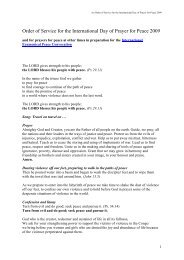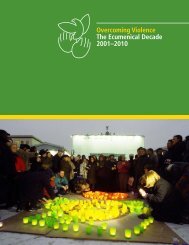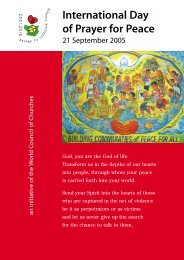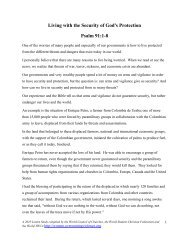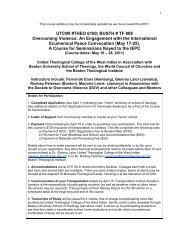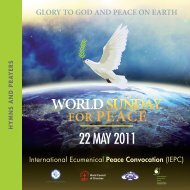Alternative Globalization Addressing Peoples and Earth
Alternative Globalization Addressing Peoples and Earth
Alternative Globalization Addressing Peoples and Earth
You also want an ePaper? Increase the reach of your titles
YUMPU automatically turns print PDFs into web optimized ePapers that Google loves.
49<br />
critically at globalization, <strong>and</strong> found that it had had a deleterious effect<br />
on people’s lives. They had experienced that globalization had led from<br />
a lack of markets to a situation where the world itself is a market, a<br />
commodity to be developed so as to return a profit. Their message to the<br />
world - “Serve God, not mammon” - was addressed not only to churches<br />
in Eastern <strong>and</strong> Central Europe, but also to churches in the West <strong>and</strong> in<br />
the South.<br />
This linking of church conferences around the world on the subject of<br />
globalization is a new ecumenical form of dealing with globalization<br />
that contributes to the AGAPE process. Budapest asked a challenging<br />
question, “Will the churches have the courage to engage with the ‘values’<br />
of a profit-oriented way of life as a matter of faith, or will they withdraw<br />
into the ‘private’ sphere?” <strong>and</strong> suggested that “This is the question our<br />
churches must answer or lose their very soul.” 20<br />
“We ask the churches to help their members to rediscover the traditional<br />
Christian values of self-restraint <strong>and</strong> asceticism (simplicity of life-style),<br />
<strong>and</strong> to propagate these values in their societies as a way of countering<br />
individualism <strong>and</strong> consumerism, <strong>and</strong> as an alternative foundation for<br />
economic <strong>and</strong> social development,” Budapest said.<br />
Global conference on economic globalization: The Isl<strong>and</strong> of Hope, Fiji,<br />
August 12-16 2001:<br />
The WCC in conjunction with the Pacific Conference of Churches<br />
organized a consultation on economic globalization in order to accompany<br />
the Pacific churches’ efforts to find alternatives to globalization. Their<br />
concept, the Isl<strong>and</strong> of Hope, holds up life-centered values deeply rooted<br />
in Pacific communities as a viable source for a just <strong>and</strong> sustainable economy<br />
<strong>and</strong> life in dignity.<br />
“Spirituality, family life, traditional economy, cultural values, mutual<br />
care <strong>and</strong> respect are components of the Isl<strong>and</strong> of Hope which prioritizes<br />
relationships, celebrates the quality of life <strong>and</strong> values human being <strong>and</strong><br />
creation over production of material goods. The Isl<strong>and</strong> of Hope is an<br />
alternative to the project of economic globalization which entails<br />
domination through an unjust system...”<br />
“On our Isl<strong>and</strong> of Hope, life is valued <strong>and</strong> celebrated in maneaba<br />
(Kiribati), the fale (Samoa), the cava ceremony (Fiji <strong>and</strong> Tonga), the<br />
bilum <strong>and</strong> sam celebrations (Papua New Guinea) <strong>and</strong> the nut celebration<br />
(Solomon Isl<strong>and</strong>s)... These symbols <strong>and</strong> rituals are living examples of<br />
the ethos of communal life <strong>and</strong> communal economic <strong>and</strong> social relations;<br />
20<br />
“Serve God, not mammon”, message from the joint consultation on globalization in<br />
Central <strong>and</strong> Eastern Europe: response to ecological, economic <strong>and</strong> social consequences,<br />
June, 24-28, 2001, Budapest<br />
21<br />
The Isl<strong>and</strong> of Hope: the Pacific churches’ response to economic globalization, WCC, 2001




